More than 11 years revealing secrets because there is no excuse for secrecy in religion – w1997 June 1; Dan 2:47; Matt 10:26; Mark 4:22; Luke 12:2; Acts 4:19, 20.
Written by: Miss Usato July 24th, 2024
Click Image Above or Click HERE to Download Case Study
On September 1st, 2024, The Jehovah’s Witnesses organization was ordered to pay $48,000 in legal costs to the Crown after multiple failed attempts to avoid participation in New Zealand’s Royal Commission of Inquiry into Abuse in Care.
In 2023, the Christian Congregation of Jehovah’s Witnesses Australasia initiated a legal challenge seeking a judicial review. Their goal was to exclude themselves from the inquiry’s scrutiny. This came after three years of behind-the-scenes legal battles aimed at keeping the inquiry from investigating them.
However, their efforts were unsuccessful. The High Court rejected their request, and when they appealed, the Court of Appeal dismissed their case in April. As a result, the Jehovah’s Witnesses have agreed to pay $32,321 in court costs for the High Court proceedings and an additional $13,212 for the Court of Appeal case, according to documents from Crown Law obtained by RNZ under the Official Information Act.
Undeterred, the organization has applied for permission to take their case to the Supreme Court, though a decision is still pending.
In a separate attempt in June, the Jehovah’s Witnesses sought an advance copy of the inquiry’s final report related to their practices. They filed an urgent claim in the High Court in Auckland, but this too was unsuccessful. They have agreed to pay $2,629 in court costs for this action.
Just days before the final report was set to be released, the Jehovah’s Witnesses made a final attempt to prevent a case study about their organization from being included in the report. This effort also failed, with Crown Law stating that the costs associated with this action are still being calculated.
This is how Jehovah’s Witnesses handle abuse cases. They were the only religious group to take legal action against the Abuse in Care Inquiry. Similar legal challenges by the organization have occurred in other countries, including the United Kingdom and Australia. This also shows the lengths the organization will go to maintain its internal practices without external interference. This resistance to scrutiny, even from government bodies tasked with protecting vulnerable individuals, is part of a broader pattern observed in other cases globally.
This article discusses the findings of an inquiry into the Jehovah’s Witnesses in Aotearoa, New Zealand. The Abuse in Care Royal Commission of Inquiry has been investigating the treatment of individuals in state and faith-based care for over five years. The final report’s release was extended, partly due to CCJW Australasia’s legal efforts. As per usual, the Organization is becoming infamous for attempting to put its process of reporting abuse on hold. They are also the only faith-based organization that attempted to be removed from the case study- and failed.
During this inquiry period, it was found that the Jehovah’s Witness Organization had a significant influence over the daily lives of its members, including how they spent their time, their education, relationships, and access to medical treatments. The faith is globally led by a governing body of eight men based in New York, and the hierarchy includes male elders who hold power and authority within congregations.
Below are just a few examples from the case study, but you can read the entire of the 64-page case study here:
Royal Commission of Inquiry Case Study June 2024, New Zealand
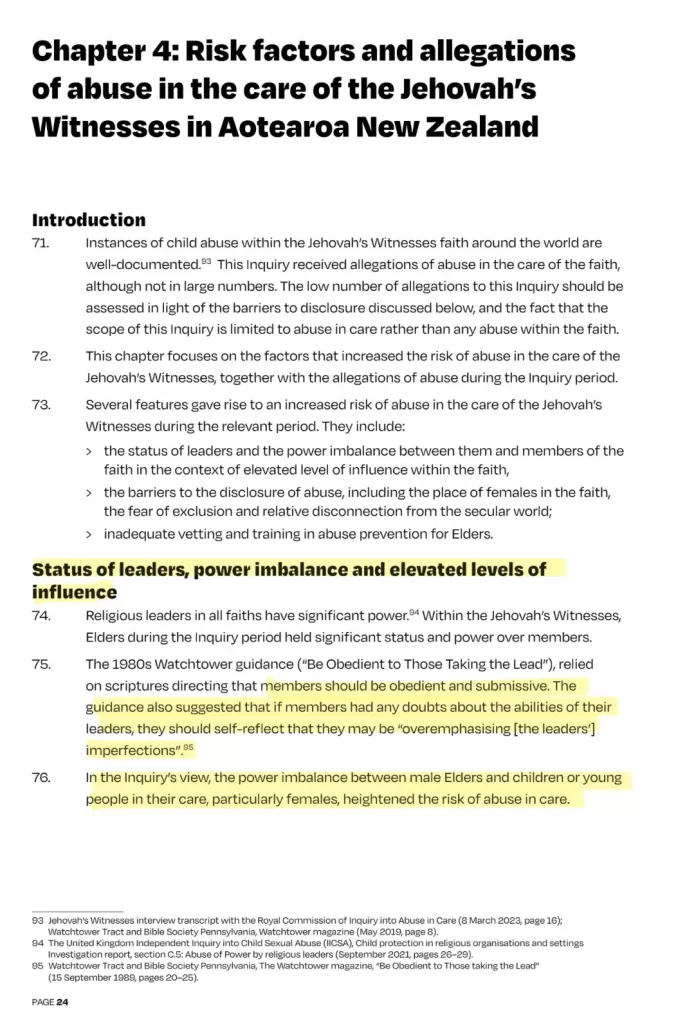
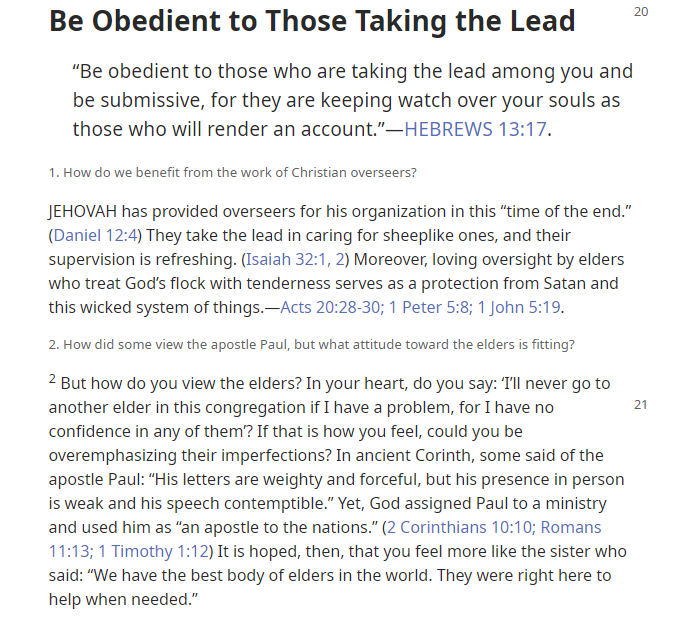
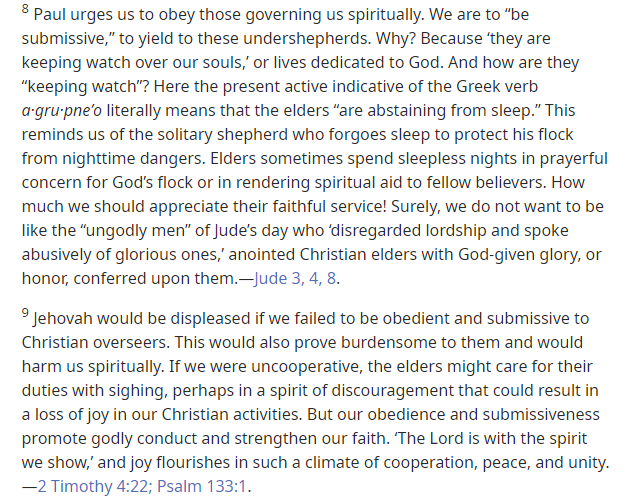
Above is page 24 of the case study, highlighting the power and influence of the Elders. To the right is from Jworg, the 1989 Watchtower Article “Be Obedient to Those Taking the Lead.”
This influence expressed in the Case Study is about the reliance on the elders, lying particularly over children and young people, as well as barriers to disclosing abuse, such as the inferior position of women, rigid disclosure processes, fear of being shunned, and disconnection from non-Jehovah’s Witnesses. The Organization also had inadequate vetting of Elders and insufficient training in preventing or responding to abuse.
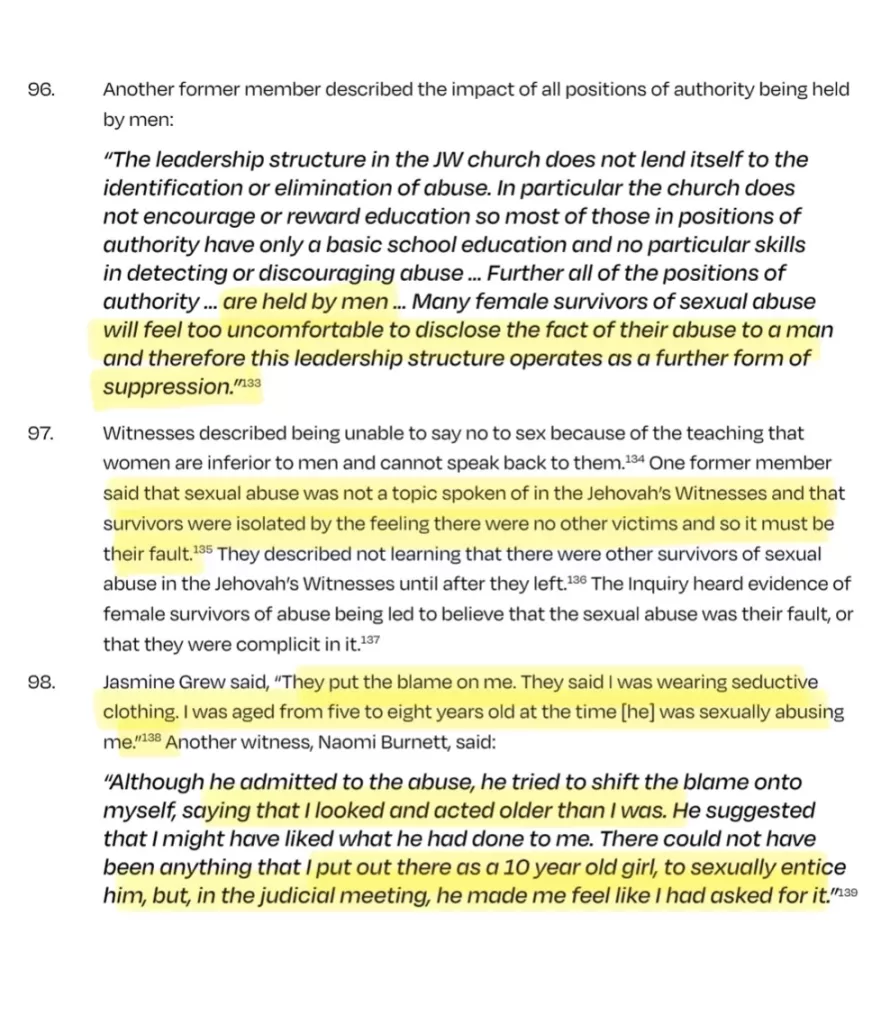
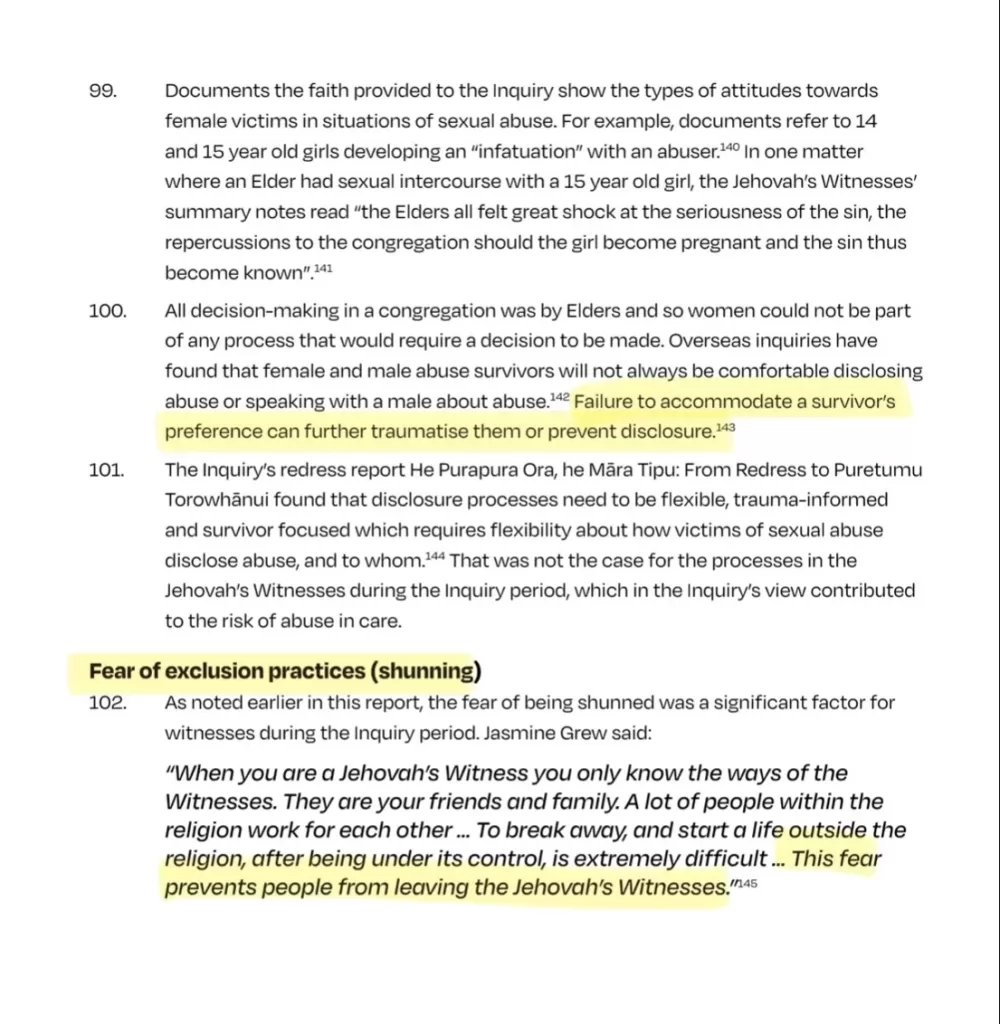
Jehovah’s Witnesses have faced significant criticism for not only their handling of abuse cases but also for their handling of their member’s personal well-being on their exclusion practices (shunning)
The organization’s internal policies often delay reporting abuse to authorities, focusing instead on internal investigations. These internal processes, designed to maintain the organization’s image, have resulted in prolonged suffering for victims of abuse and a lack of timely justice. The trial underscored the need for transparency and the prioritization of children’s rights over institutional reputation.
A similar pattern has emerged and is exposed in this case study. The Jehovah’s Witnesses were accused of handling abuse allegations within their closed community, often discouraging victims from seeking external help. The organization’s elders typically conduct internal investigations (which are pretty biased and inadequate.) This case study revealed how the emphasis on internal resolution and confidentiality can prevent victims from receiving the support and protection they need, further perpetuating a culture of silence and secrecy.
These cases highlight a troubling trend within the Jehovah’s Witnesses practices, where the focus on internal management and protecting the organization can overshadow the urgent need for external intervention and victim support. The lack of timely reporting to law enforcement delays justice and poses a risk to other potential victims.
Shayne Mechen, an advocate and former Jehovah’s Witness who has been involved in helping the victims speak their truth to the Royal Commission, says, “There are a few things regarding the report. The Jehovah’s Witnesses claimed that they don’t fit within the scope of the inquiry and that they don’t look after the children in their care, even though their publications and the testimonies of former Jehovah’s’ Witnesses show that they do. Overall, it was a good result for the commission. Several former elders told Mechen that they don’t know what Watchtower has to be worried about because the report on the organization’s policies is accurate.”
Trigger warning for those finding it difficult to read detailed instances of abuse
“The Royal Commission, “finds that Ms SC was in the care of the faith at the time of the abuse. The faith conferred power and authority on the Elder. He assumed responsibility for Ms SC through an informal pastoral care relationship, related to the faith’s work, namely Bible studies and caring for ‘fatherless children’ within the congregation.” – Article from The SPINOFF, July 25th, 2024 ‘These are the stories the Jehovah’s Witnesses went to court to stop you reading’
A former Jehovah’s Witness who is going by Ms SC testified about her abuse that happened in 1980 when she was just 15. She talks about a trusted Elder who would give her rides home after her bible study with his wife. “Instead of going home, he took me to another nearby area with no houses or anything. This was when the abuse took place. It happened many times over four to five months.” Her story details the abuse, which I will leave to the viewer’s discretion if they wish to read more details in the article linked below. Once the rest of the elders in the congregation found out about Ms. SC’s abuse, instead of going to authorities, the summary notes read, ‘The Elders all felt great shock at the seriousness of the sin, the repercussions to the congregation should the girl become pregnant, and the sin thus become known.’”
Another victim, Jasmine Grew, expresses her haunting experience when she was 12 years old. After she told two elders of her abuse, They brought her to the back room, where they interrogated her without her parents knowing. They were asking the worst questions you can imagine for someone 12 years old. “They wanted to know everything. Their questions were inappropriate. At that age, it was a terrifying experience for me. It seemed as abusive as the sexual abuse itself … I was honest, and I told them everything because I had to be honest. I was fearful of the consequences of Armageddon. The two words that come to me still now are humiliation and embarrassment … [The Elders] were very intimidating. They did not attempt to support or comfort me in this process.”
This reminds me of 68. in the Commissions case study:
‘The Jehovah’s Witnesses told the Inquiry that where there is a serious allegation, Elders never interview children and do not take children into back rooms to cross-examine them and that there has always been a policy to that effect. The faith said that judicial committees only interview parents’
“On Wednesday, New Zealand released a 3,000-page report detailing the results of a six-year investigation completed by the Abuse in Care Royal Commission into the abuse of children and vulnerable adults. The takeaways are devastating. And, as you might guess, religion is a huge part of the problem.” -New Zealand report finds 200,000 abuse victims in care of state, faith-based groups
“The Government will publicly apologize to those who have been abused, neglected, and tortured at the hands of the state- and faith-based institutions, and will now prioritize a system to compensate survivors in an attempt to right decades of wrongs.” -Article from NEWSROOM, July 24th, 2024 ‘Government takes the blame, will apologize to children abused and tortured in state care’
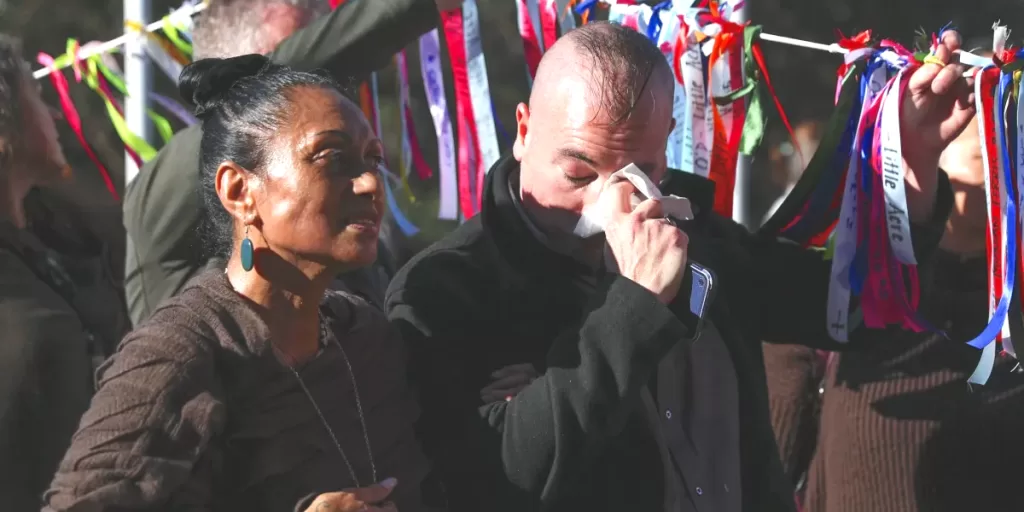
“After decades of abuse and cover-ups, the Government has formally acknowledged children were tortured at the hands of the state. The Royal Commission of Inquiry into Abuse in Care has found that over five decades, children, young people, and vulnerable adults were subjected to “unimaginable physical, emotional, mental and sexual abuse, severe exploitation and neglect” at the hands of the state and faith-based institutions.”- Laura Walters Editor for Newsroom
The government apology, led by the Prime Minister, will be delivered in November as part of the second recommendation of the commission’s report, which also calls for adopting a new redress scheme. The manner and venue of this apology are being planned in collaboration with survivors.
In addition to the Prime Minister’s apology, the commission recommends that all faith-based leaders offer public apologies. This includes the Pope, the Archbishop of Canterbury, the President-Elect of the Methodist Church, the Moderator of the Presbyterian Church in New Zealand and the heads of each Presbyterian Support Organization, the General of the Salvation Army, the Overseeing Shepherd of Gloriavale, and the Governing Body of Jehovah’s Witnesses.
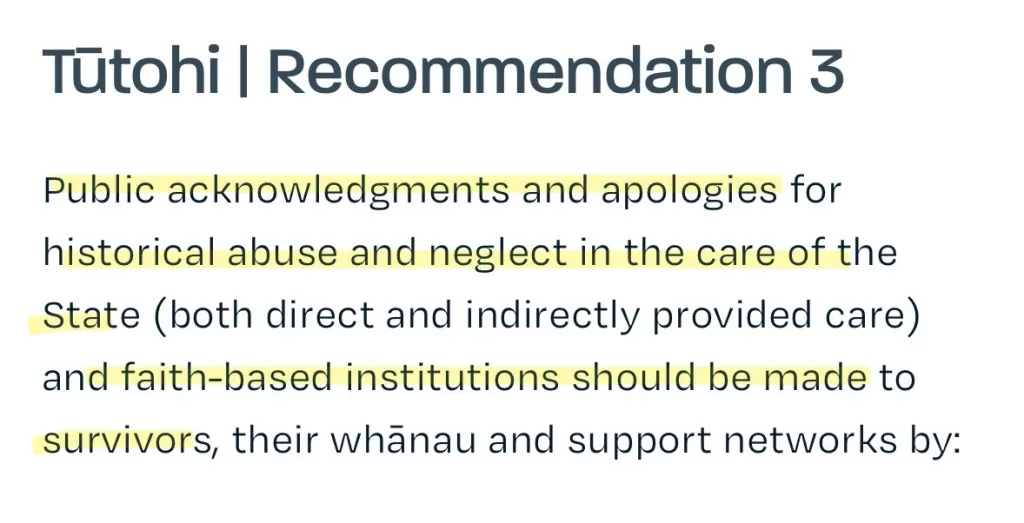

Just one example in the 138 recommendations from the Case Study was that the Governing Body of Jehovah’s Witnesses should make a public apology for the abuse and neglect in the care of Jehovah’s Witnesses in New Zealand.
There is an overpour of accusations around the world not only regarding Child Sexual Abuse but of spiritual abuse and misogynistic power over the members. They prioritize the organization’s reputation over the welfare of victims. Do you think the Governing Body will apologize for these unjust acts of neglect as the New Zealand Government recommends? Or are they too close to God to apologize?
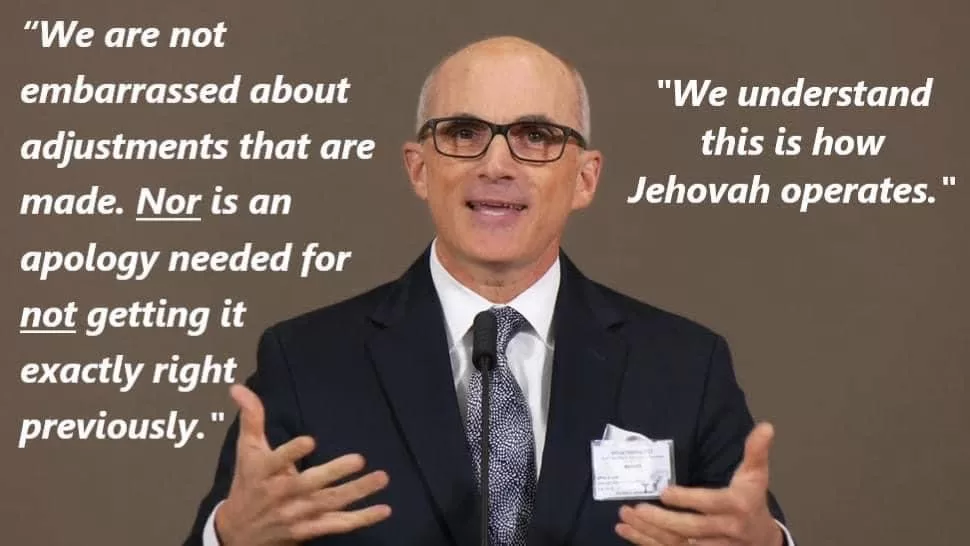
Links involving the New Zealand Royal Commission process:
New Zealand High Court Dismisses Judicial Review
Unveiling the truth: New Zealand Abuse in Care Inquiry and Jehovah’s Witnesses

Aiding Transparency to Watchtowers teachings. If you have additional information about this topic or would like to reach the author- Please email [email protected]